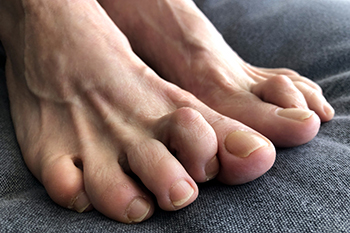
Hammertoe, a toe deformity resembling a hammer, can be a source of discomfort and mobility issues. While non-surgical treatments are often the first line of defense, surgical options become necessary when the condition is unresponsive to conservative measures, or if it reaches an advanced stage. The hallmark symptom of hammertoe is the upward bend in the middle toe joint, which, if left untreated, can lead to pain, blisters, calluses, or corns. When the discomfort becomes severe, surgical intervention may be recommended by your podiatrist. One common surgical approach is tendon lengthening, where the surgeon extends the tendon in the affected toe to enhance flexibility. This procedure aims to restore a more natural position to the toe and alleviate associated pain. Tendon transfer is another surgical option. In this procedure, part of a tendon from the bottom of the toe is moved to the top, enhancing flexibility and promoting a healthier range of motion in the toe. For cases where stability is compromised, joint fusion may be recommended. During this surgery, metal pins or screws are inserted into the toes, creating internal immobilization. Recovery periods may vary, and following postoperative instructions care is essential for the best results. To determine the most suitable surgical option based on the specifics of your hammertoe, it is suggested that you discuss the matter with a podiatrist.
Hammertoe
Hammertoes can be a painful condition to live with. For more information, contact Dr. Lubrina Bryant from District Podiatry, PLLC. Our doctor will answer any of your foot- and ankle-related questions.
Hammertoe is a foot deformity that affects the joints of the second, third, fourth, or fifth toes of your feet. It is a painful foot condition in which these toes curl and arch up, which can often lead to pain when wearing footwear.
Symptoms
Causes
Genetics – People who are genetically predisposed to hammertoe are often more susceptible
Arthritis – Because arthritis affects the joints in your toes, further deformities stemming from arthritis can occur
Trauma – Direct trauma to the toes could potentially lead to hammertoe
Ill-fitting shoes – Undue pressure on the front of the toes from ill-fitting shoes can potentially lead to the development of hammertoe
Treatment
Orthotics – Custom made inserts can be used to help relieve pressure placed on the toes and therefore relieve some of the pain associated with it
Medications – Oral medications such as anti-inflammatories or NSAIDs could be used to treat the pain and inflammation hammertoes causes. Injections of corticosteroids are also sometimes used
Surgery – In more severe cases where the hammertoes have become more rigid, foot surgery is a potential option
If you have any questions please contact our office located in Washington, D.C . We offer the newest diagnostic and treatment technologies for all your foot and ankle needs.